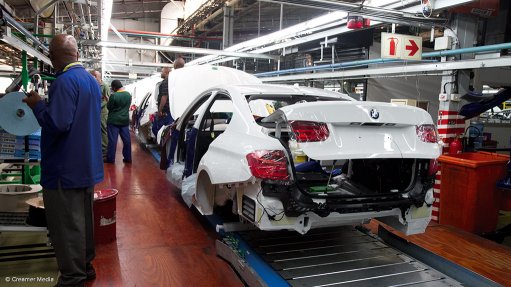
Photo by: Duane Daws
South Africa can only benefit from greater political and currency stability, says BMW purchasing and supplier network board member Dr Klaus Draeger.
He says the German vehicle manufacturer has noted, with some concern, the strong depreciation of the rand, as well as the “not so strong” political situation.
“What we need to see, what we wish, is to get back some stability. If we have a stable political situation, the rand will stabilise. This will help us, and it will help the local economy and the local suppliers as well.”
Draeger is also concerned about the possibility of a labour disruption in the South African automotive industry later this year, should wage talks culminate in a prolonged strike, as was the case in 2013.
Draeger is familiar with South Africa’s automotive industry. He spent four years at BMW South Africa (SA) as head of technical purchasing, from 1996 to 1999.
BMW announced last year that it will invest R6-billion at BMW SA’s Rosslyn plant to produce the next-generation X3 sports-activity vehicle (SAV) for the local and export markets.
BMW’s Spartanburg plant, in the US, also produces the X3.
Rosslyn will continue production of the current 3 Series through its life cycle, with the first production changes at the plant scheduled for this year.
The 47-year-old plant has assembled four generations of 3 Series sedans since 1994, with the sixth-generation model currently in production outside Pretoria.
“With the new X3 we have given South Africa a lot of credit and we need stable production conditions for the vehicle,” emphasises Draeger.
Considering that a vehicle’s life cycle includes three years of research, and around seven to eight years on the showroom floor, it means that each model requires a stable period of around ten years, he adds.
It also means that South Africa has been given ten years’ credit, says Draeger.
Should this period lack stability, any decision to continue model production will, naturally, be “critically reviewed”.
A ten-year horizon also means that BMW SA will benefit from certainty around the extension of government’s Automotive Production and Development Programme, which is scheduled to end in 2020. This is already a work in progress at the Department of Trade and Industry.
Labour Concerns
BMW sales and marketing board member Dr Ian Robertson – a former MD at BMW SA – concurs that South Africa currently faces “a lot of headwinds, both politically and economically”.
“There are some things to sort out. The rand and its volatility is nothing new. Rand volatility is part of emerging economy status, but I think some of the political issues really do need resolution.”
Robertson does not want to expand on what these political issues may be, noting only that some “political uncertainty” has been created. However, echoing Draeger, he reiterates that he remains “passionate about South Africa”.
Robertson applauds the reappointment of Pravin Gordhan as Finance Minister as the right step in terms of prudent financial management for South Africa.
South Africa in December saw the rand plummet to new lows when President Jacob Zuma fired then Finance Minister Nhlanhla Nene, replaced him with Des van Rooyen, only to appoint former Finance Minister Gordhan a few days later, following national and global concern regarding the appointment of Van Rooyen.
“We continue with our investment [in South Africa],” says Robertson.
The programme to build the X3 in South Africa is “a strong commitment”, he adds. “The SAV segment is growing all around the world.”
However, he warns, this investment also brings “expectations”.
He notes that his discussions with the National Union of Metalworkers of South Africa as MD – he left South Africa in 2005 – focused on the fact that BMW SA was now playing “in the international league”, and neither the plant nor Numsa could continue to “do as it had always done”.
“The last time there was a strike in South Africa we moved a lot of production from the plant and we did not bring it back,” says Robertson.
“You can’t just say that you will catch it back. It does not work like that.
“You also cannot say never strike, but there are risks to that type of approach, in particular on plants that are heavily export-orientated. Customers do not really mind where their cars are made, they want what they want.
“These relationships need continuous nurturing.”
In 2014, BMW 3 Series sedan production volume at Rosslyn reached 68 721 units, with exports at 61 735 units.
X3
Robertson says the decision to replace the 3 Series with the X3 at the Rosslyn plant comes on the back of a drive to broaden BMW’s production facilities for the X3.
“We looked at what was available around the world and South Africa fitted the bill. Around 80% of production will be exported.”
Robertson says the global SAV market is “very strong”.
He does not foresee any difficulty as Rosslyn moves from sedan assembly to SAV production, as the X3 is built on the same architecture as the 3 Series, with a number of shared components.
Robertson says SAV sales within the BMW group have grown to around 700 000 units, or 30% of the manufacturer’s build.
“Every market is growing on SAV. In the US, 40% of our mix is SAVs, with the SAV market at 55% – 55% of all cars sold in US is SAV. We are lagging, which tells you we need more capacity.”
* Engineering News spoke to Draeger and Robertson at the Geneva Motor Show.